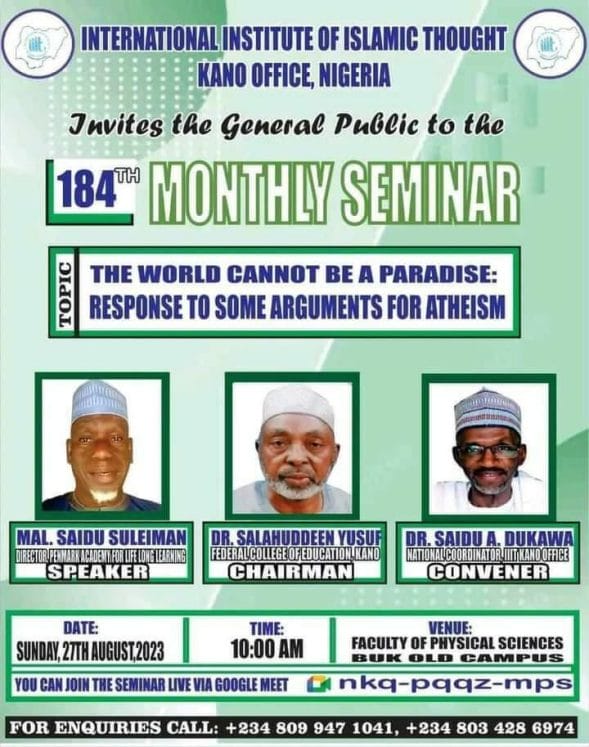Atheism and Improbability of Jannah
By Leo Igwe
Atheism and Islamic belief in Jannah were the main focus of a recent event in Kano. The theme of the 184th monthly seminar of the International Institute of Islamic Thought, The World Cannot be a Paradise: Response to some arguments for atheism, has generated a lot of debate and discussions within the atheist and freethought communities. Many atheists have wondered why these self-acclaimed Islamic thinkers could not address their belief in Jannah without referencing atheism. I did not participate in the event. I could not have physically attended due to widespread hatred and intolerance of atheists and atheism in Islam as practiced in the region. Like many atheists, I found the theme curiously interesting.
So, here I try to contribute to the event. The first part of the topic says, `The world cannot be a paradise`. Really? This saying may sound like an emphatic dismissal of the idea that the world could be a paradise, right? It resonates as a statement of faith in the existence of heaven. Well, this is not the case. This declaration is rather a tacit acknowledgment of some inner conflict, it is an indicator of some persistent struggle or rather a stubborn refusal to accept the fact that this world is a paradise. The statement is rooted in skepticism, in some unyielding sense of doubt, disbelief, and confusion with the idea of paradise that Islam preaches. The theme shows a lack of surety or certainty about the Jannah that Muslims believe in, or are made to believe they would inherit in the afterlife. It signals that the inheritance of Jannah could be an exercise in futility, a figment of the islamic mind, some delusion, or merely wishful thinking.
In the face of the fact that this could be the only life, the only world that humans have, the religion of Islam has occasioned a crisis of faith among Muslims. It has put its members in a dilemma, and a difficult situation. Islam preaches a notion of paradise that Muslims have found attractive but cannot immediately relate to or behold. So the faith has caused a sense of alienation, a disconnect, a dissatisfaction, and yes a disorientation among believers. It has made Muslims live in denial of things that they should readily have accepted as true and real. Islam has made muslims to accept as real and unquestionably true things that they would have regarded as false and fictitious, dubious and doubtful. Islam teaches that paradise, Jannah, is an abode of pleasure and enjoyment for the righteous in the afterlife. It holds that the level of enjoyment and pleasure will be a factor and scale of one’s righteousness. But many Muslims are in doubt. They disbelieve and find the idea of Jannah improbable hence the growing concern over atheism and disbelief among the Islamic Ummah.
In the second part of the topic, the organizers created the impression that they were tackling some of the arguments for atheism. They set out to address the atheistic proposition that this could be the only world that we have. Muslims should confront their inner doubts, and struggle with the improbability of the Islamic paradise. Yes, this world could be Jannah. There is no evidence of the Islamic garden in the hereafter. This world is all that we have. This life is all that we have. There is no afterlife as Muslims believe. There is no other world as Muslims imagine. This world is Jannah.
Leo Igwe holds a doctoral degree in religious studies from the University of Bayreuth in Germany




